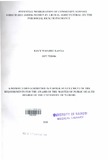| dc.description.abstract | Health care financing is a major area of concern in strengthening health systems. An equitable health financing system increases access to health care, improving health and ensuring that individuals take advantage of economic and social opportunities available to them. Resource mobilization instruments based on point of service payments are regressive, limiting access to care and thus resulting in general ill health. Pre-payment and risk sharing mechanisms are encouraged to address this challenge. Social health insurance is a viable health financing option that is being explored in various settings.
Women generally bear a heavier burden of ensuring the good health of their families, including ensuring family members' access health care when illness strikes. Societies, and particularly women, have always organized themselves into social support groups from where they draw support when catastrophes strike and also advance their economic welfare. These groups are well organized with administrative regulations that are adhered to by all members.
This study assessed the amenability of social support structures among women ill a rural agricultural setting to a social health insurance scheme. Knowledge of social health insurance, attitudes and perceptions towards the same and, willingness and financial ability to participate in a social health insurance scheme were determined. The average cost of accessing health care for women in this setting was also estimated. The hypotheses that social support structures exist among women in rural agricultural communities and that these can be used to pool resources for health in this sector were tested. A descriptive cross sectional study was designed to address the study objectives.
The study populations included eligible women, focus groups and key informants drawn from the study area. A total sample of four hundred and twenty two (422) was determined for the quantitative study. In addition, four (4) focus groups and six (6) key informants were recruited for the qualitative component. A sampling frame of existing social support groups in this community was developed after an initial mapping of a rural agricultural setting and a multi stage sampling approach used to select members for participation in the study. Both qualitative and quantitative approaches were used to address the study objectives.
The study achieved a 98.3% response rate with four hundred and fifteen (415) of the possible respondents interviewed. Approximately three quarters of the respondents had primary level of education and above, making them fairly literate. Different social support groups existed in this study area. Study respondents were all members of one or more social support groups in their community. All respondents made regular financial contributions to their groups. The respondents spent an average of Kshs 600 every time they needed to access health care. Their mean income was Kshs 1,411.81 making the cost of accessing health care way above their financial abilities. Almost all (99%) of the respondents expressed interest in joining and contributing towards a social health insurance scheme, regardless of their socio demographic characteristics.
The concept of health insurance is well known among the respondents though there is limited knowledge on social health insurance. The cost of accessing health care cited by the respondents was generally higher than their incomes. Social support groups among women in this setting are well organized with functional administrative structures in place. When faced with a pressing need for finances for health care, study participants opted to sell off their household assets, a trend which could easily lead them into poverty traps. Another coping mechanism among the study participants was not to seek health care at all or opt for traditional health care which may not adequately address their health care needs. The end result of this is poor health reducing the individual's overall productivity.
With the Kenyan government venturing into social health insurance, social support groups are amenable to a social health insurance scheme. Relevant implementers can build the capacity of already established structures for them to serve as collection points for insurance premiums. The scheme, if successful, can be replicated in similar settings effectively cutting down on the costs of setting up administrative structures for the implementation of social health insurance in the rural areas. | en_US |

